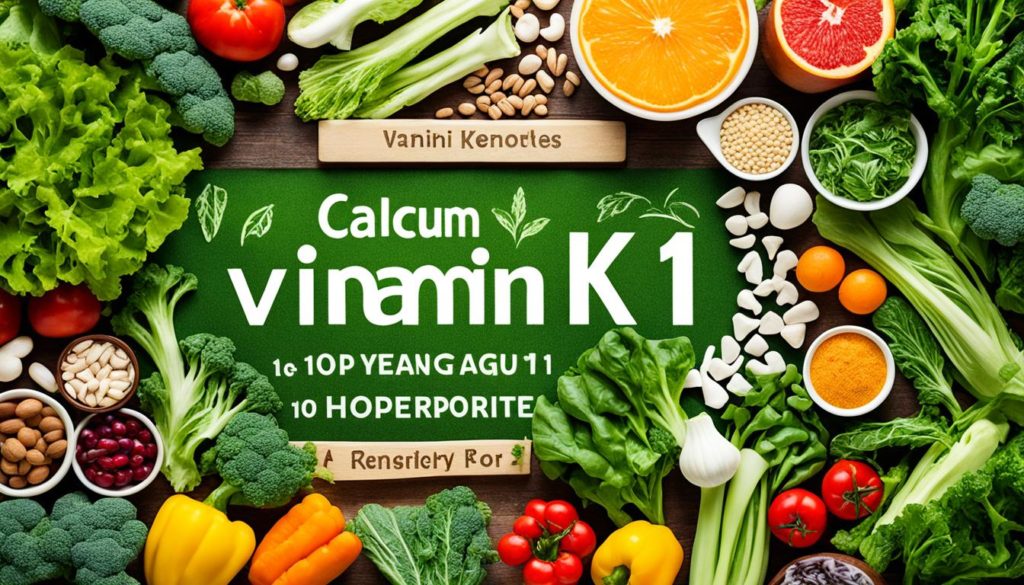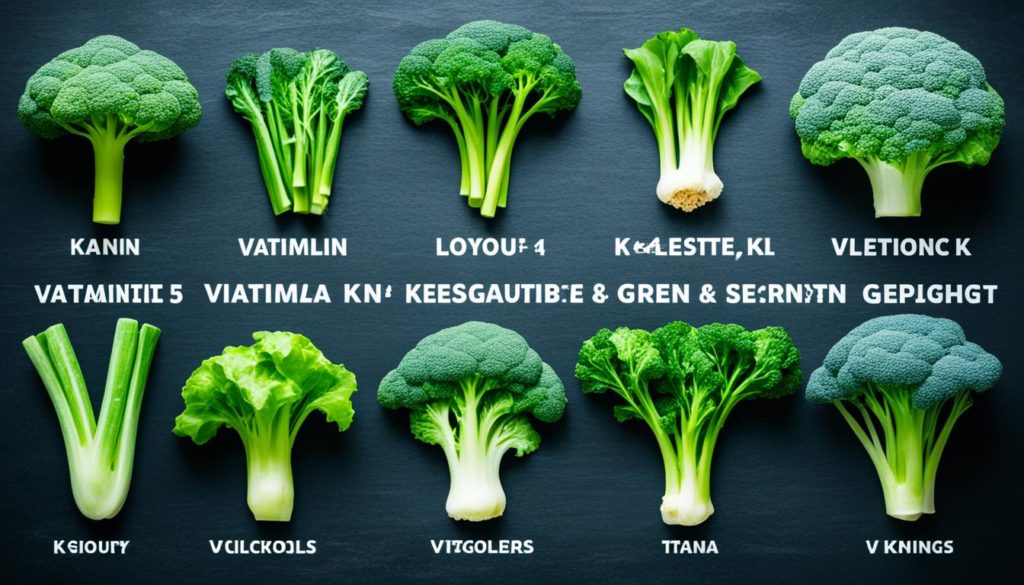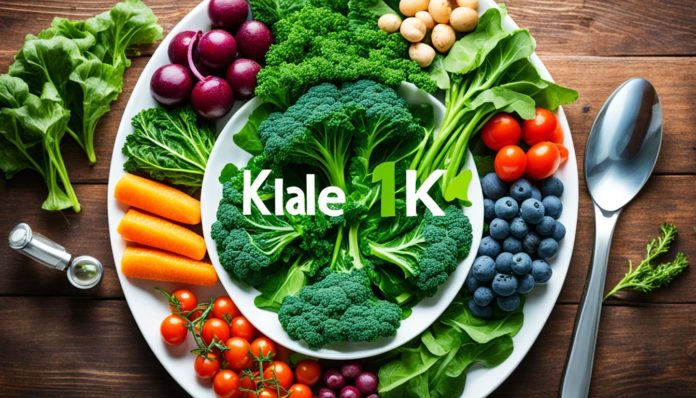Vitamin K1, known as phylloquinone, is crucial for health. It helps in blood clotting, maintains bone health, and supports the heart. Eating foods rich in Vitamin K1 is key for well-being.
It’s important to know where to find Vitamin K1 to enjoy its benefits. This piece highlights Vitamin K1’s roles and where to get it from. Let’s dive into the benefits of Vitamin K1 and the top foods to eat.
Key Takeaways
- Vitamin K1 is crucial for blood clotting and preventing excessive bleeding.
- It supports bone health by aiding in calcium regulation and bone density.
- Phylloquinone sources include leafy green vegetables and certain fruits.
- Consuming sufficient Vitamin K1 can enhance cardiovascular health.
- Optimal intake of Vitamin K1 can be achieved through a balanced diet or supplements.
For more on essential minerals, check out this detailed guide on potassium, another key nutrient.
Introduction to Vitamin K1
Vitamin K1, known as Phylloquinone, is important for our bodies. It’s found in green veggies and helps with blood clotting and bone health. Knowing about Vitamin K1 definition shows us why it’s key in our diet.
What is Vitamin K1?
Vitamin K1, or Phylloquinone, comes from plants. You can find it in foods like spinach and kale. Eating a variety of foods gives us the Vitamin K1 we need for good health.

The Role of Vitamin K1 in the Body
Phylloquinone does more than help blood clot. It activates important proteins and aids bone health. The Vitamin K1 definition includes its role in keeping our hearts healthy. Getting enough Vitamin K1 is vital for our health.
Health Benefits of Vitamin K1
Vitamin K1, also known as phylloquinone, plays a vital role in our bodies. It helps with blood clotting, keeps bones strong, and guards the heart. Knowing how Vitamin K1 benefits you can guide your diet to improve health.
Importance in Blood Clotting
Vitamin K1 is a key player in blood clotting. It helps make proteins that stop too much bleeding when injured. Without enough Vitamin K1, our bodies can’t clot properly, leading to dangerous bleeding.
Bone Health and Vitamin K1
Vitamin K1 is crucial for keeping bones healthy. It activates a protein that sticks calcium to our bones. This process strengthens bones, making them less prone to breaks and osteoporosis.

Cardiovascular Benefits
Vitamin K1 is good for the heart too. It keeps our arteries from getting hard and narrow. By preventing calcification, Vitamin K1 lowers the risk of heart diseases. This shows why getting enough Vitamin K1 is vital for heart health.
| Health Benefit | Role of Vitamin K1 |
|---|---|
| Blood Clotting | Enables synthesis of proteins necessary for coagulation |
| Bone Health | Supports bone mineralization by activating osteocalcin |
| Cardiovascular Health | Regulates vessel calcification to maintain arterial flexibility |
Sources of Vitamin K1
Vitamin K1 (Phylloquinone) is crucial for our bodies. Getting it from your diet is necessary. Knowing where it comes from can help you stay healthy.
Natural Food Sources
Leafy green vegetables are top sources of Vitamin K1. Here are the greens packed with it:
- Kale
- Spinach
- Swiss Chard
- Broccoli
These greens don’t just give you Vitamin K1. They also boost health with vitamins and minerals. Brussels sprouts and green beans are good for you too.
Fortified Foods
Fortified foods also boost Vitamin K1 levels. They include:
- Breakfast cereals
- Nutrition bars
- Fortified plant-based milk
These options are great if greens aren’t your thing or if you can’t eat them. They help meet vitamin needs.
To wrap up, there’s a variety of foods with Vitamin K1. They suit many diets, helping everyone get enough of this nutrient.
Vitamin K1 Supplements
Vitamin K1 supplements are key for anyone needing more of this vital nutrient. It’s called Phylloquinone and comes mainly from green veggies and plants. If your diet lacks these, supplementing with Phylloquinone is a good plan.
Understanding the forms and uses of Vitamin K1 supplements is important.
- Tablet and Capsule Forms: These forms are easy to use and very common.
- Liquid Drops: Perfect for anyone who finds pills hard to swallow.
- Combined Supplements: Phylloquinone is often added to other vitamins to boost nutrient intake.
Always be careful with how much you take. A healthcare provider can help figure out the right amount for you. This is really important if you have health issues or take other medicines.
The way your body absorbs Phylloquinone can change based on the supplement. Studies show that these supplements make sure you get a consistent amount. This helps keep your vitamin levels where they should be.
Adding Vitamin K1 supplements wisely to your daily routine helps you meet your nutrition goals. And it keeps your health on track.
Vitamin K1-Rich Foods
It’s crucial to add Vitamin K1-rich foods into your diet for good health. The main type of Vitamin K1, known as Phylloquinone, is found in many leafy greens and other veggies.
Leafy Green Vegetables
Leafy greens are top sources of Vitamin K1. They’re full of nutrients and work in many recipes. Some of the best ones are:
- Kale
- Spinach
- Collard greens
- Swiss chard
- Bok choy
Adding these veggies to your meals is easy. For a tasty and healthy option, check out this grilled asparagus with parmesan. It’s great with lots of main dishes.
Fruits and Other Vegetables
There are many veggies and fruits that are high in Vitamin K1 besides leafy greens. Try adding these to your meals:
- Broccoli
- Brussels sprouts
- Asparagus
- Carrots
- Blueberries
- Grapes
| Food Item | Vitamin K1 Content (mcg per 100g) |
|---|---|
| Kale | 817 |
| Spinach | 483 |
| Broccoli | 176 |
| Blueberries | 19 |
By eating a variety of Vitamin K1-rich foods, you’ll get the nutrients you need. This helps keep your body healthy and strong.
Vitamin K1 Deficiency
It’s very important to know the risks of Vitamin K1 deficiency for your health. If you lack Vitamin K1, you might bleed for a long time, bruise easily, and break bones. These issues can greatly affect your daily life and future health.
If you don’t get enough Vitamin K1, your body might fight off sickness poorly and heal slowly when hurt. This nutrient is key for clotting blood and keeping bones strong. Without enough, you could face major health problems.
Many things can cause a lack of Vitamin K1. They include a bad diet, certain illnesses, and using some medicines for a long while. Those who don’t eat many Vitamin K1 foods, people with belly problems, and those on blood thinners are at most risk. It’s key to keep an eye on your Vitamin K1 levels to stay healthy.
| Key Risk Factors | Associated Symptoms |
|---|---|
| Insufficient Dietary Intake | Bleeding, Bruising |
| Gastrointestinal Disorders | Bone Health Issues |
| Long-term Medication Use | Delayed Wound Healing |
To reduce these risks, eat more foods with Vitamin K1 and talk to doctors when needed. Knowing the signs of low Vitamin K1 and the problems it brings can help you act early. This will lead to better health in the future.
Vitamin K1 Absorption
The body needs to absorb Vitamin K1 well to use this essential nutrient right. Many things can affect how well the body takes in Phylloquinone, the scientific name for Vitamin K1. Knowing these things and improving absorption can help our health a lot.
Factors Affecting Absorption
Several things can slow down how well Vitamin K1 is absorbed:
- Dietary Fat Content: Since Vitamin K1 dissolves in fats, it’s absorbed better with dietary fats. Without enough fats, absorption may drop.
- Intestinal Health: Problems like celiac disease or Crohn’s disease can hurt nutrient absorption.
- Bile Production: Bile helps digest fats. If bile production is low, Vitamin K1 absorption might decrease.
How to Improve Absorption
We can do several things to help our bodies absorb more Phylloquinone and benefit from it:
- Consume Dietary Fats: Eat Vitamin K1-rich foods like leafy greens with healthy fats, such as olive oil or avocado, to boost absorption.
- Maintain Gut Health: A well-functioning gut absorbs nutrients better. Eating foods with probiotics and prebiotics can make your intestines healthier.
- Avoid Excessive Alcohol Intake: Too much alcohol can harm the intestines and affect nutrient absorption. Drinking less helps keep the gut healthy.
To show how these steps can increase Vitamin K1 absorption, look at this table comparing efficiency with and without these methods:
| Enhancement Strategy | Absorption Efficiency |
|---|---|
| With Dietary Fats | High |
| Without Dietary Fats | Low |
| Healthy Gut | High |
| Compromised Gut Health | Low |
| Limited Alcohol Intake | High |
| Excess Alcohol Intake | Low |
Recommended Daily Intake of Vitamin K1
It’s key to know how much daily Phylloquinone you need for good health. The National Institutes of Health (NIH) gives specific rules for Vitamin K1 RDI. This helps everyone get the right nutrients.
| Age Group | Vitamin K1 RDI (mcg/day) |
|---|---|
| Infants (0-6 months) | 2.0 |
| Infants (7-12 months) | 2.5 |
| Children (1-3 years) | 30 |
| Children (4-8 years) | 55 |
| Children (9-13 years) | 60 |
| Adolescents (14-18 years) | 75 |
| Adult Men (19 years and older) | 120 |
| Adult Women (19 years and older) | 90 |
These daily Phylloquinone requirements help ensure we get enough Vitamin K1. Vitamin K1 is key for blood clotting and bone health. It’s found mainly in green leafy veggies. Check the NIH’s fact sheet for more on Vitamin K1.
Knowing these guidelines helps keep you healthy and avoids deficiencies. Eating lots of green veggies is a great way to meet your daily Phylloquinone needs.
Interactions with Other Nutrients and Medications
Understanding how Vitamin K1 interacts with other things is vital for your health. This is especially true for Phylloquinone and medications. In this part, we talk about these interactions and why they matter for your daily health.
Vitamin K1, or Phylloquinone, is key for blood clotting and bones. Yet, some medicines can change how it works. For example, blood thinners like warfarin and Vitamin K1 might not work well together. This can cause drug issues and health risks.
Antibiotics can also affect Vitamin K1. They might stop gut bacteria from making Vitamin K1, leading to a shortage. It’s smart to talk to a doctor before taking new antibiotics to avoid this problem.
Drugs for seizures and weight loss can mess with how your body uses Vitamin K1. You might need different doses or other drugs. Cholesterol medicines called bile acid sequestrants can also affect Vitamin K1, making it hard for your body to absorb.
The table below shows how different medicines interact with Vitamin K1:
| Medication | Type of Interaction | Effect on Vitamin K1 |
|---|---|---|
| Warfarin (Blood Thinner) | Antagonistic | Decreased Efficacy |
| Antibiotics | Inhibitory | Potential Deficiency |
| Anticonvulsants | Absorption Interference | Reduced Efficiency |
| Orlistat (Weight Loss) | Absorption Interference | Reduced Availability |
| Bile Acid Sequestrants | Absorption Interference | Reduced Availability |
Knowing about these interactions is key. Talking with a healthcare provider helps manage your Vitamin K1 intake. It ensures you get its benefits without health issues. Always seek personalized medical advice when dealing with medications and nutrients.
Conclusion
Vitamin K1, also known as Phylloquinone, is key for our health. It helps our blood clot and keeps our bones strong. It also supports heart health. To avoid health issues, it’s important to get enough of it, either through diet or supplements.
There are many foods rich in Vitamin K1, like green veggies and some fruits. But, it’s good to know how to absorb it better. Also, how it might react with other stuff you take. Planning your diet well can help you enjoy all its benefits.
In closing, eating the right foods and possibly taking supplements can ensure we get enough Vitamin K1. It’s very important for stopping diseases and keeping healthy. Making sure we have enough Vitamin K1 is a smart move for a healthy body.
FAQ
What is Vitamin K1?
Vitamin K1, also known as Phylloquinone, is important for our health. It helps our blood clot and keeps bones strong. You can find it in green leafy veggies.
What are the health benefits of Vitamin K1?
Vitamin K1 is great for your body. It makes proteins that stop you from bleeding too much. It also keeps your bones healthy and may lower heart disease risk.
What are some natural food sources of Vitamin K1?
You can find Vitamin K1 in foods like kale, spinach, and broccoli. Fruits like kiwi and grapes, and veggies like green peas and asparagus, have it too.
Can Vitamin K1 be taken as a supplement?
Yes, you can take Vitamin K1 as a supplement. It’s especially good if you don’t eat enough greens. Make sure to talk to a doctor before you start any new vitamins.
What are the risks of Vitamin K1 deficiency?
Not having enough Vitamin K1 can cause problems. You might bleed too much or get bruises easily. It’s also bad for your bones. Eating foods with Vitamin K1 can help avoid these issues.
How is Vitamin K1 absorbed in the body?
Your body absorbs Vitamin K1 in your intestines with bile acids’ help. Things like your diet, certain medicines, and how healthy your digestive system is can affect this process.
How can I improve the absorption of Vitamin K1?
To absorb Vitamin K1 better, eat some fat with your meals. This can help, along with eating a balanced diet. Try to keep your gut healthy too, maybe with probiotics.
What is the recommended daily intake of Vitamin K1?
Adults should get 120 micrograms (men) or 90 micrograms (women) of Vitamin K1 daily. It’s important to hit these numbers for your health.
How does Vitamin K1 interact with other nutrients and medications?
Vitamin K1 could change how some medicines work. This includes blood thinners and some antibiotics. Always talk to your healthcare provider about your vitamins and medicine.


